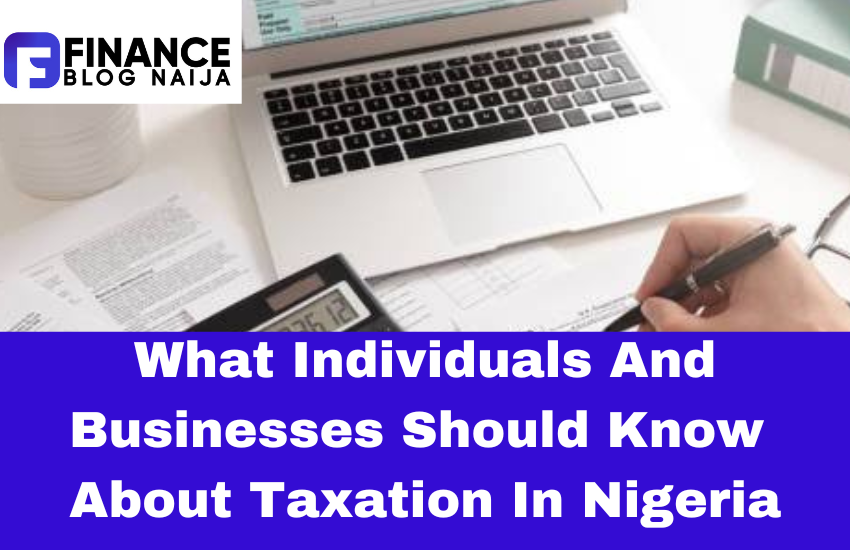Hello, fellow finance enthusiasts!
Today, we want to look into the complex world of taxation in Nigeria.Yeah! Complex because a lot of us don’t like to talk about it but it actually concerns all of us.
Whether you’re an individual looking to understand your tax obligations or a business owner navigating the complexities of corporate taxation, this expository guide is here to help you break down the subject.
So grab your favorite drink, settle into a comfy chair, and let’s embark on this interesting and enlightening journey!
UNDERSTANDING THE NIGERIAN TAX SYSTEM
First things first, let’s familiarize ourselves with the Nigerian tax system.
In Nigeria, taxation is regulated by the Federal Inland Revenue Service (FIRS) on a national level while the various state revenue agencies handle that of each state (like LIRS-Lagos State Internal Revenue Service for Lagos, etc).
There are several types of taxes applicable to individuals and businesses, and understanding each is crucial for compliance and financial planning.
TYPES OF TAXES IN NIGERIA
A. PERSONAL INCOME TAX (PIT):
For individuals, the cornerstone of taxation is the Personal Income Tax (PIT). This tax is imposed on the income earned by individuals, including salaries, wages, bonuses, and other forms of income. The rates for PIT are progressive, meaning they increase as income rises.
The rates for personal income tax is fixed at 24%.
Personal income tax deductions include:
I. Pension Contributions:
Contributions made to a registered pension scheme can be deducted from your taxable income.
II. National Housing Fund (NHF) Contributions:
Employees contributing to the NHF can claim a deduction for their contributions.
III. National Health Insurance Scheme (NHIS) Contributions:
Deductions are available for contributions made to the NHIS.
IV. Charitable Donations:
Donations to registered charities can be deducted from your taxable income
B. CORPORATE INCOME TAX (CIT):
Business owners, this one’s for you! Corporate Income Tax (CIT) is levied on the profits of companies registered in Nigeria. The standard CIT rate is 30% for large companies. These are companies with gross turnover greater than NGN 100 million annually.
The CIT rate for medium companies with gross turnover greater than NGN 25 million and less than NGN 100 million is 20%.
While the CIT rate for small companies with gross turnover of NGN 25 million or less is 0%, with some specific industries enjoying lower rates.
Corporate tax income deductions include:
I. Capital Allowances:
Businesses can claim capital allowances on qualifying assets, such as machinery, equipment, and buildings, over their useful life.
II. Business Expenses:
Ordinary and necessary business expenses incurred in generating income can be deducted.
III. Research and Development (R&D) Expenses:
Certain R&D expenses may qualify for deductions.
IV. Bad Debts:
Provisions for bad debts can be deducted if certain conditions are met.
C. VALUE ADDED TAX (VAT)
Value Added Tax (VAT) is a consumption tax applied to goods and services at a rate of 7.5%. It is borne by the final consumer but collected and remitted by businesses to the tax authorities.
D. WITHHOLDING TAX (WHT):
Withholding Tax (WHT) is an advance payment of income tax deducted at the source. It applies to various types of payments, such as dividends, interest, royalties, and contracts, made to individuals or companies. The WHT rates vary based on the type of payment.
E. INDIRECT TAXES:
Apart from direct taxes like PIT, CIT, and WHT, Nigeria also imposes indirect taxes that businesses need to consider:
I. Excise Duties:
Excise duties are levied on specific goods produced or manufactured in Nigeria, such as tobacco, alcoholic beverages, and petroleum products.
II. Customs Duties:
Businesses involved in import and export activities are subject to customs duties, which vary based on the type and value of goods.
TAX AUDITS AND DISPUTE RESOLUTION
Tax audits are conducted by the tax authorities to verify the accuracy and completeness of tax returns. If you or your business is selected for an audit, cooperation and accurate documentation are essential. In case of disputes with the tax authorities, there are administrative and legal avenues available for resolution.Tax Obligations and Compliance
A. Tax Identification Number (TIN):
For both individuals and businesses, obtaining a Tax Identification Number (TIN) from the FIRS is mandatory. Your TIN serves as your unique identifier for tax purposes and is used for all tax transactions.
B. Filing and Payment Deadlines:
Taxpayers in Nigeria have specific deadlines for filing their tax returns and making tax payments. For individuals, the deadline is usually around March 31st of the following year, while businesses must file their tax returns within six months of their accounting year-end. You need to keep a close eye on these deadlines to avoid penalties and interest.
C. Tax Planning and Incentives:
Smart tax planning is essential for individuals and businesses alike. Understanding available tax incentives and exemptions can significantly reduce your tax burden. For instance, some industries and regions in Nigeria offer tax holidays and other benefits to attract investments.
THE IMPORTANCE OF PROPER TAX RECORD KEEPING
For both individuals and businesses, maintaining accurate financial records is crucial. This practice not only ensures compliance but also helps you track your financial progress and identify potential areas for improvement.
TAX INCENTIVES AND INVESTMENT OPPORTUNITIES
Nigeria offers various tax incentives to promote economic growth and attract investments in specific sectors. These incentives may include tax holidays, pioneer status incentives, and tax relief for industries considered strategic to the country’s development.
PENALTIES FOR NON-COMPLIANCE AND AVOIDING TAX EVASION
Avoiding tax evasion is of utmost importance. Nigerian tax authorities are becoming increasingly vigilant in combating tax evasion and non-compliance. Penalties for non-compliance can range from financial fines to imprisonment, so it’s in your best interest to meet your tax obligations diligently.
CONCLUSION
Well done! You’ve made it through this comprehensive guide on taxation in Nigeria. Whether you’re an individual or a business owner, understanding your tax responsibilities is vital for financial success and staying on the right side of the law.
By staying informed, planning wisely, and maintaining proper records, you can navigate Nigeria’s tax landscape with confidence and peace of mind. Happy tax-paying and peaceful living!









